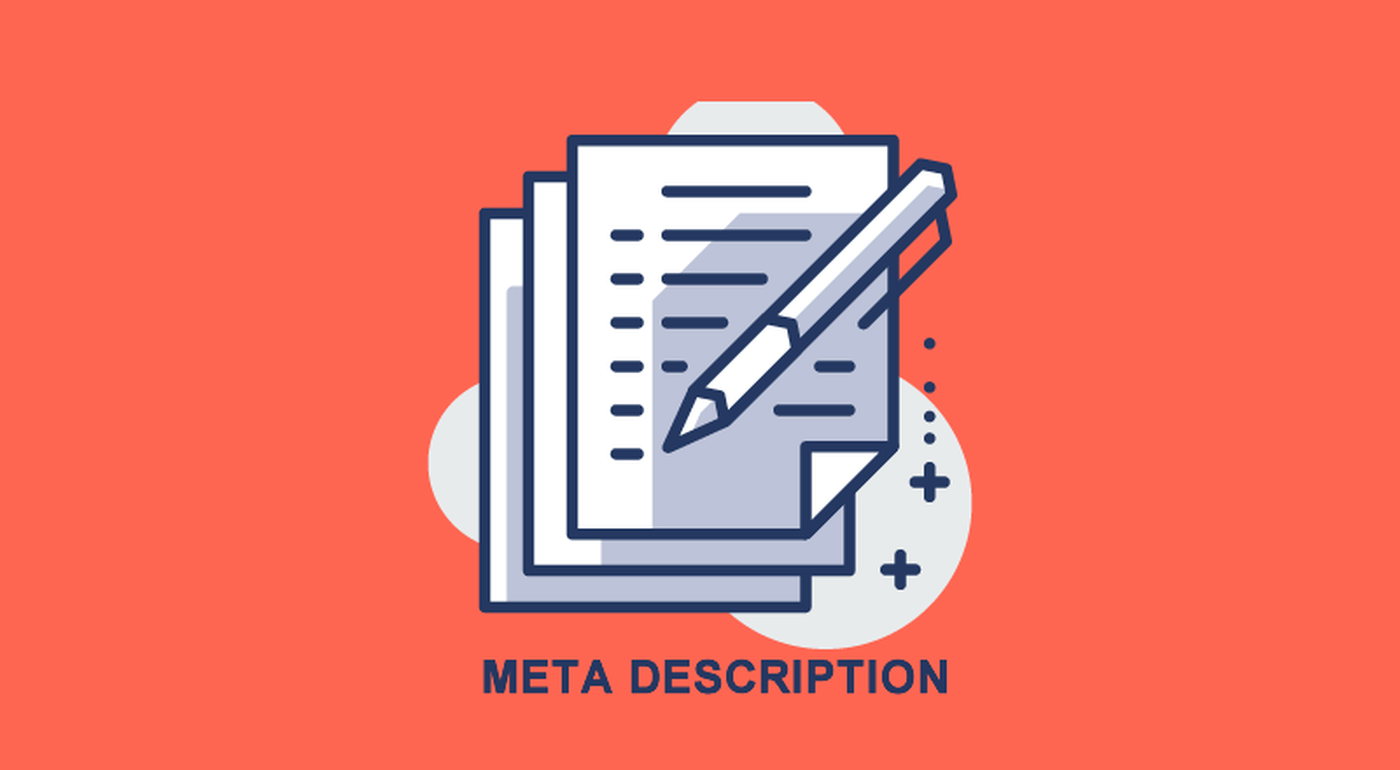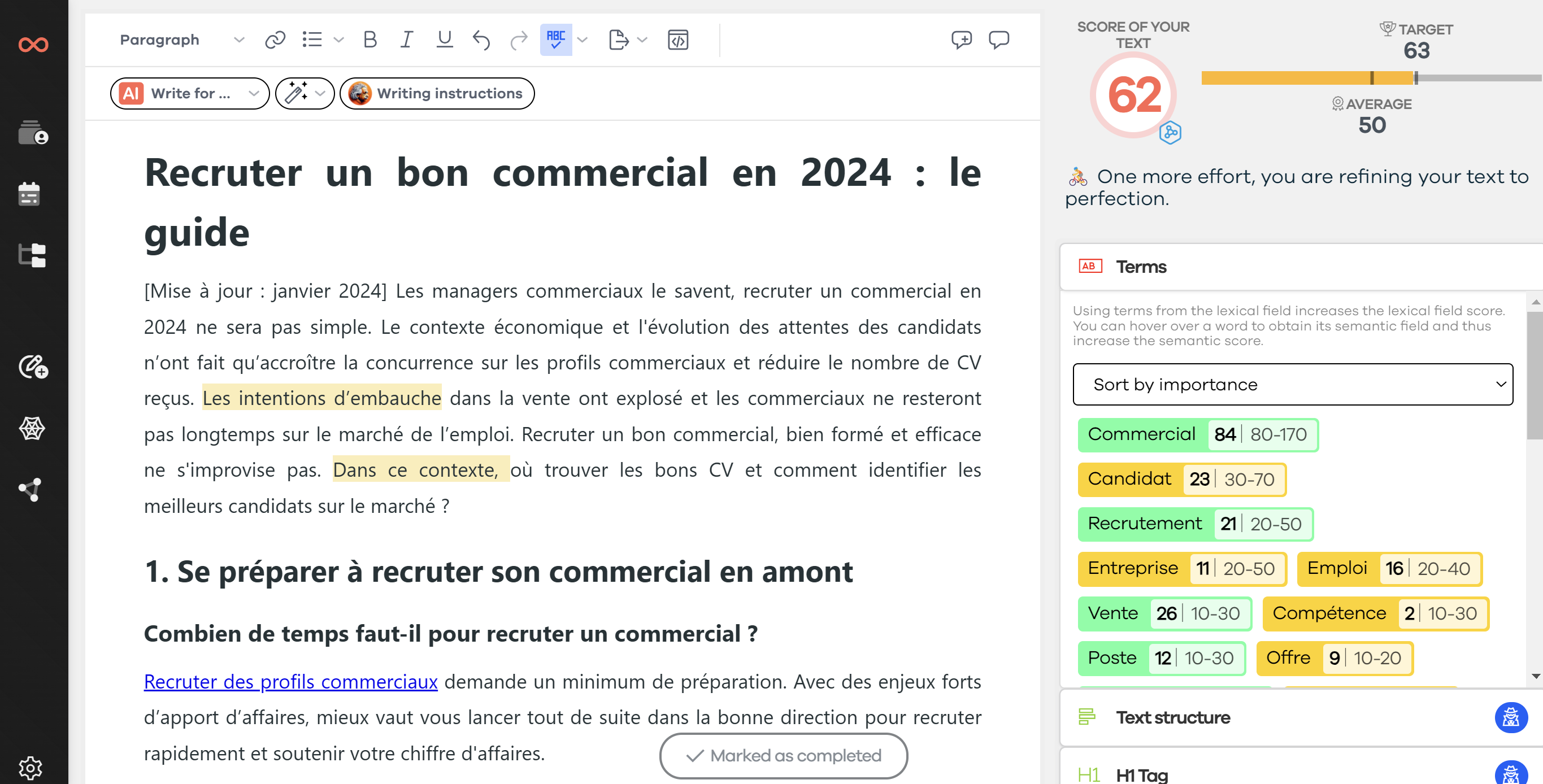To be visible on search engine results pages, you're well aware that you need to optimize your website. Although there are settings you can directly apply to your pages (technical and content), you also work on external factors (popularity). These combined optimization actions are what we call SEO on-page and off-page. So, let's go over everything that needs to be put in place to boost your organic search ranking.
🚀 Quick Read: One minute to learn about SEO on-page and off-page factors
Do you want to quickly know the SEO on-page and off-page criteria? Here's the checklist that brings together all the information you need!
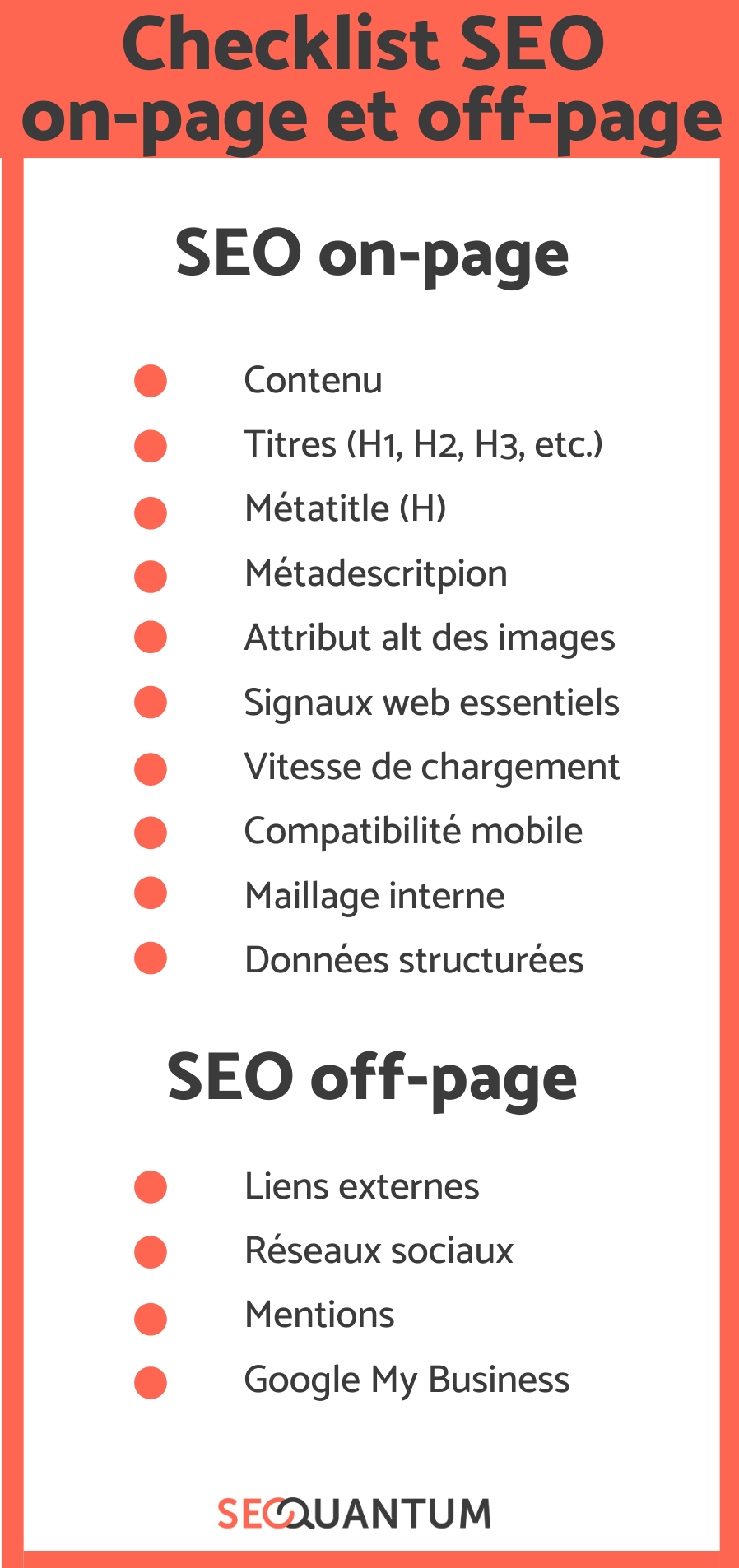
❓ What are the 2 main components of SEO optimization?
As you know, to improve your website's organic search ranking, you need to implement concrete content marketing actions. To do this, you will work on the 2 main components of SEO optimization: "on-page" and "off-page".
But what do these terms mean that you must absolutely know to be visible on search engines, especially Google?
1. Definition of the SEO on-page component
SEO "on-page" refers to the settings you can directly make on your pages and your website. You control these actions directly, can adjust them as you see fit, and update them whenever you want.
2. Definition of the SEO off-page component
SEO "off-page" refers to the acquisition and optimization levers external to your website. Although you cannot control everything that happens outside your pages, you can optimize what you put in place.
🎛️ The essential SEO on-page settings
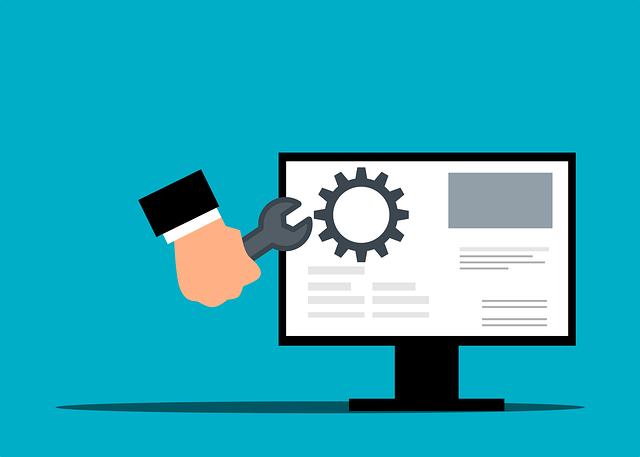
I invite you to discover in detail the SEO on-page optimizations that you need to implement to improve your organic search ranking.
Content
To be able to engage your reader and inform indexing robots about the relevance of your content, you must write high-quality texts that meet users' search intent. This is the absolute priority for optimizing SEO on-page and a long-term approach. To do this, you need to focus on the semantic optimization of your content.
Titles (H1, H2, H3, etc.)
The titles and subtitles of your web pages have two SEO objectives:
- quickly inform your visitor about the content offered and capture their interest so they spend more time on your page;
- improve your SEO by placing your keyword in an area highly considered by search engines.
Meta Title (Title or H)
The meta title is the title that appears on search engines (if Google hasn't decided to change it) and in your browser tab. Once again, there is a dual objective in optimizing this SEO on-page element:
- showcase your content and entice Googlers to click on it;
- optimize another hot zone for your organic search ranking.
Meta Description
The meta description is the text that appears on search engines below the title. Although it doesn't seem to have a direct impact on your SEO (a subject of debate among SEO specialists), it is still important for improving the click-through rate. This leads to an indirect influence on your search ranking: the more users choose your article in the SERP, the more search engines will consider it an interesting page for their users.
Alt Attribute of Images
An indexing robot is not (yet?) able to understand the content of an image. That's why it's essential to provide its alt attribute! Indeed, this will be read by search engines to determine the interest of the visual media offered.
Additionally, this information will be useful for visually impaired users who can then access this element. To optimize your alt attributes, I recommend the following:
- use a maximum of ten words to accurately describe the image;
- add your query or keyword;
- provide geolocation information (if relevant).
URL
The choice of words in your URL is important for your organic search ranking. It is considered that Google, as well as Bing or Yahoo, gives SEO "weight" to each word placed in your reticular address. So, think about reducing them as much as possible (avoid stop words) and placing your main keyword in them.
Core Web Vitals
Core Web Vitals, as the name suggests, are essential for optimizing your website's SEO on-page. They are mainly factors to consider to ensure a good user experience (UX) for your readers. Here are the 3 points to check to make sure you meet Google and users' needs:
- LCP: page loading performance;
- FID: reaction time after executing an action;
- CLS: visual stability of your web pages.
Loading Speed
For years, Google has warned that your site's loading speed is an important factor for your positioning on search results pages. Although this element may not have as much influence on your SEO as it seems, it should still be taken into account. Besides, isn't it annoying to land on a page that takes several seconds to load?
Mobile Compatibility
By checking the information in your Google Analytics, you will likely find that nearly 60% of your visitors access your site from a mobile device (phone or tablet). The proportion of these mobile users continues to increase year after year. That's why search engines have implemented a way to prioritize sites on mobile versions (Mobile First).
Internal Linking
The links you add to your content have a significant influence on your search ranking. Some SEO specialists even consider it a crucial factor if you want to be well-positioned in the SERP. Offering complementary pages to the one being navigated has two direct influences on your SEO:
- your visitors spend more time on your site;
- indexing robots easily crawl your pages.
Structured Data
Adding structured data to your pages helps Google better understand their content. Moreover, it can boost your search ranking if the queries you work on lend themselves to displaying rich results (rich snippets) on the SERP. This is especially the case for selling products or services (Google review ratings are displayed), events, and recipes.
📢 The most important SEO off-page levers
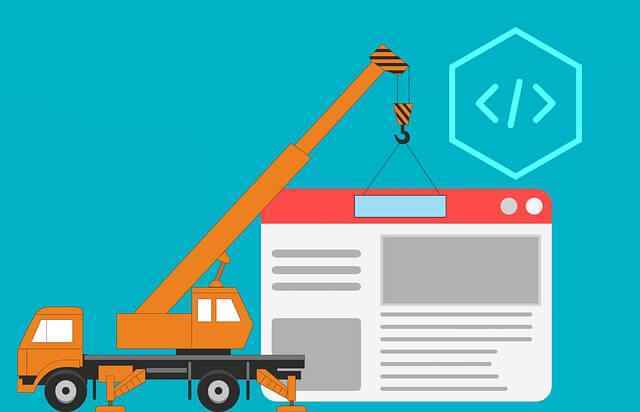
Now let's take a look at the SEO off-page optimization factors that you can implement and master in the long run.
External Links
Implementing a link building strategy to obtain backlinks is an almost absolute necessity for improving your Google positioning. If authoritative sites in a related niche recommend you by providing a link to your site, Google will think (rightly so!) that you offer trustworthy pages.
Social Networks
A link placed on a social media platform will not be taken into account by search engines. However, this off-page SEO factor is important for your search ranking! Indeed, if your content is widely shared and you have significant traffic spikes on your site, Google will consider that your pages are interesting and deserve to be displayed at the top of the SERP.
Mentions
Without linking to your site, your brand name appears on another page dealing with the same domain? Then, know that this is a positive element for search engines! In reality, it seems almost impossible that every time your name is mentioned, there is a hyperlink to your site. Therefore, this proves that you are not engaged in a frantic race for backlinks and will add value to this information.
Google My Business
This off-page SEO criterion has become essential today. Widely integrated into search results pages, Google My Business (GMB) listings allow you to appear at the top of the SERP for relevant queries. Moreover, they are very effective in searches made on Google Maps, which represents a large potential traffic volume.
💥 SEO On-page and Off-page: What's Most Important?
Some will assure you that creating backlinks is the most important element for improving your SEO. On the other hand, others will tell you that only content is essential. For my part, I am convinced that to succeed in your search ranking, you must work on all optimization axes at your disposal.
Indeed, these elements are fundamentally linked, and to succeed in being visible on the Internet, you should not neglect one or the other. I see it as if you wanted to market a car. If you only build an engine and neglect to manufacture a body and advertise, then you don't have much hope that your business will work...
Of course, the actions you initiate depend heavily on your resources and capabilities. However, I remind you that there are over 200 criteria taken into account by Google's algorithms. It's true that each one does not have the same influence on your ranking. Nevertheless, they all deserve to be considered to have a chance of reaching first place on search engine results pages.
In any case, I believe it is pointless to optimize SEO off-page before your on-page settings are perfect, or at least correct. If you have just launched your site or are starting your SEO strategy, I recommend focusing first on the most important criteria for your "on-page" optimization. Once this task is completed, you can then embark on the "off-page" optimization of your site.
To perform SEO on-page optimization, you should always think about the user (first and foremost) and then the indexing robots. When you optimize SEO off-page, you mainly seek to improve your popularity (or notoriety) on the Web. By combining SEO on-page and off-page, you then put all the chances on your side to increase your visibility on the Internet.
And you? What actions have you already implemented? Are there other optimization elements that you apply and have allowed you to rank first on Google?
The most important thing to acquire organic traffic is to respect the recommendations made by search engines, understand the behavior of users, and know the operation of SEO algorithms. To broaden your knowledge, I invite you to read this other blog post: Understanding and History of Google's Search Algorithm.
Need to go further?
If you need to delve deeper into the topic, the editorial team recommends the following 5 contents:
- How to Optimize Your Website's Google Ranking?
- Operation and History of Google's Search Algorithm
- Enhancing Content for Google with Search Console Insights
- 17 Techniques to Find a Link Building Opportunity and Link to Your Content
- How to Create a Link Building Strategy for Acquiring External Links (Backlinks)?
